Sarah Ash's Blog, page 10
April 6, 2017
Liberating Grandmothers: a Guest Post for Women in SF & F Month 2017
It’s a real pleasure to have been invited by Fantasy Cafe to contribute to the sixth Women in SF & F 2017 Month! You can read what I have to say about grandmothers – not only in my own work but in folklore and genre fiction. But there are many other fascinating guest posts to read on this website both new (throughout April) and from previous years by women writing in these challenging genres. Thank you to Fantasy Book Cafe for giving me the opportunity to participate!
Please Feel Free to Share:







April 3, 2017
How Do You Like Your Speculative Fiction? A Guest Post from Sarah Higbee
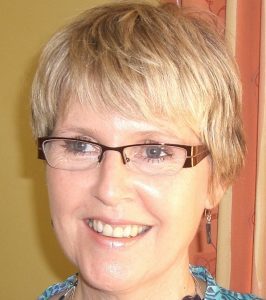
How Do You Like Your Speculative Fiction?
During this winter, I’ve been engrossed in desert-based fantasy, all sweaty effort trudging up and down dunes and worrying about where the next drop of water is coming from, which has been an enjoyable escape from the rain lashing down outside. When thinking about it, I’ve coined the phrase Sand and Sorcery – so reading that, did you wince and roll your eyes at yet another stupidly named sub-sub-genre designed to confuse and alienate potential newcomers? Or shrug your shoulders and grin?
As a reader and reviewer, I am very much divided on the issue of sub-genres. On one hand, I am grateful for the kind of nifty short-hand provided by labels such swords and sorcery or fairytale retellings. I’m in the business of trying to cajole folks to pick up this marvellous book I’ve just completed and experience the same magic I did – therefore it’s no good fervently recommending The Hunger Games to someone who hates dystopian science fiction and is somewhat allergic to teenage protagonists. I’d like to think that part of my task as reviewer is to ensure that sort of mismatch doesn’t occur on my watch.
However, I am also uncomfortably aware that by raising these very flags, there will be a number of readers visiting my blog who take one look at the dystopian sci fi and YA genre labels and immediately dismiss the book. However, it is well characterised, the worldbuilding is deft and effective without overdoing the techie flourishes and Suzanne Collins has some lovely barbed humour at the expense of our consumerist society embedded within the dystopia. If that YA label was replaced with something along the lines of Brave New World meets Big Brother in that both these classic books both depict an uprising against an unjust, highly centralised system, then perhaps some of those science fiction fans who won’t go near The Hunger Games might have given it a chance and enjoyed it. But would that frighten off the teenage audience who this YA adventure is aimed at?
As a writer, I am even more ambivalent about this business of pinning a genre-specific strand on my work. In common with most authors I know, I start out with a particular vision of what I’m writing, but somewhere during the weeks and months of the creative process, it always turns into something else. Often I am unsure what I’ve written until I’ve completed at least a couple of editing passes, when I’ve pared back the excess words, got rid of the dead-end plotlines and distilled the character arcs into a coherent journey.
So when I am asked to sum up my own work and put a label on it, that can be a tricky ask. It requires me to have the clarity to stand back from the creative process, ignore the initial impulse that drove me to write the book in the first place and then search through all the sub-genres floating around and find the most suitable. No wonder newbie writers get tied up into such knots over this requirement.
It is crucial for agents and acquisition editors, however, who need to be able to see at a glance whether this submission is going to be yet another one of dozens in a sub-genre they already have covered. Or if this is something fresh and quirky that takes the concept in a wholly different direction, like Sarah’s wonderful Tide Dragons series, which is an epic Japanese fantasy adventure.
What about you? How do you regard the use of sub-genre labels – are you divided about their use, as I am? Or do you have a firm opinion, one way or another? I’d love to hear what you think!
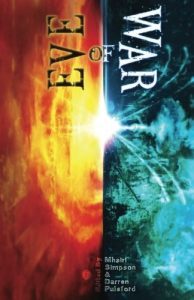
Sarah Jane Higbee
Born the same year as the Russians launched Sputnik, I confidently expected that by the time I reached adulthood, the human race would have a pioneer colony on the Moon and be heading off towards Mars. So I was at a loss to know what to do once I realised the Final Frontier wasn’t an option and rather lost my head – I tried a lot of jobs I didn’t like and married a totally unsuitable man.
Now I’ve finally come to terms with the fact that I’ll never leave Earth, I have a lovely time writing science fiction and fantasy novels while teaching Creative Writing at Northbrook College in Worthing. I’ve had a number of short stories, articles and poems published – the most recent being my story ‘Miranda’s Tempest’ which appeared last year in Fox Spirit’s anthology Eve of War. I recently signed a publishing contract with Grimbold Publishing for my science fiction novel Netted, which is due to be released in 2019.
I live in Littlehampton on the English south coast with a wonderful husband and a ridiculous number of books. I can be found online chatting about books at my book review blog https://sjhigbee.wordpress.com/ and you’re very welcome to pop onto my website www.sjhigbee.com and my Facebook page https://www.facebook.com/sjhigbeeauthor/.
Please Feel Free to Share:







March 31, 2017
The Guest Blog Returns…
Nobody Knew She Was There
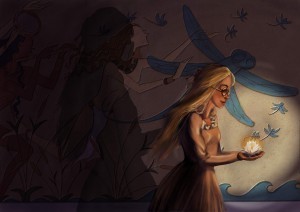
Female Fantasy and Science Fiction Writers share their thoughts on the state of the SFF genre today…and what’s most important to them when they pick up their pens.
It’s a year since I launched the first Guest Blog and welcomed a dazzling array of Guest Posts here throughout the year. Do check them out if you’re interested in what makes SFF writers tick, what inspires – and annoys – them and how the world of writing for a living pans out when you’re doing it day-to-day.
And after a period of winter hibernation, Nobody Knew She Was There is back with fascinating new posts from writers who – in spite of the many difficulties presented by the current climate – are still writing challenging, readable and different SFF.
So, if you’re a reader, a writer yourself, or just intrigued by the genre, do visit the website – from 3rd April onward – to catch up with my first guest, respected writer, poet and book-blogger, Sarah Higbee, and her illuminating post entitled:
How Do You Like Your Speculative Fiction?
Please Feel Free to Share:







March 1, 2017
‘Lord of Snow and Shadows’ available in Special Limited BookBub offer!
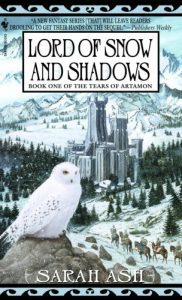
With nearly 500 five-star ratings on Goodreads: Gavril never knew his father, but he’s expected to take his place as a ruler anyway. Can he accept his new fate — and the powers that come with it? An epic fantasy adventure!
Publisher Description
Combining the best of fantasy traditions with her own unique vision, Sarah Ash brings to dazzling life a new saga filled with epic adventure and unforgettable characters. Far-reaching in scope and imagination, Lord of Snow and Shadows embarks on a journey like no other–into a shape-shifting world teeming with political intrigue, astonishing magic, and passions both dark and light.
Please Feel Free to Share:







January 24, 2017
Sarah Higbee reviews Emperor of the Fireflies
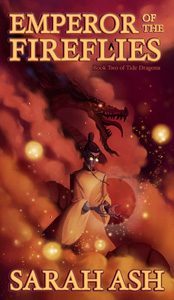
January can be a cold and depressing month, so I was really cheered to read this lovely review of Emperor of the Fireflies in Brainfluff – my thanks to Sarah Higbee!
Review of KINDLE Ebook Emperor of the Fireflies – Book 2 of the Tide Dragons series by Sarah Ash
Please Feel Free to Share:







January 11, 2017
Emperor of the Fireflies on Teaser Tuesday
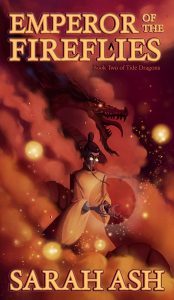
A lovely surprise today as Sarah Higbee chose an extract from Emperor of the Fireflies for Teaser Tuesday on her website. Sarah wrote a lovely review of The Flood Dragon’s Sacrifice (Book 1 of Tide Dragons) and I’m delighted that she’s accepted to write a post for the Guest Blog later on in the spring. More news on upcoming writer guests for Spring 2017 will follow soon.
Please Feel Free to Share:







December 29, 2016
Nobody Knew She Was There… Women SFF Authors Talking About Their Lives in Writing
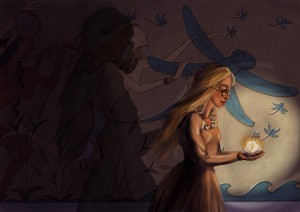
It’s been a varied and fascinating year of differing perspectives on the craft of writing and the life of the female genre writer – and I’ve been delighted and honoured to host so many brilliant – and different – contributions.
Thank you to all the authors who took part in 2016!
It all began in March with a post by Jessica Rydill.
Then in April, came contributions from Stephanie Burgis, Jan Edwards, Freda Warrington and Juliet E. McKenna
May brought guest posts from Jenny Barber, Kari Sperring, Cora Buhlert, Liz Williams and Justina Robson.
In June came Joanne Hall and Mary Corran – and then a summer break.
In the autumn, Anne Nicholls got things off to a fine start. Then came T. Frohock, Storm Constantine, Jacey Bedford and Melanie Ifield.
Each author has had something enlightening, fresh and thought-provoking to say about their craft. If you’ve enjoyed these thoughts about what it means to be a writer in these challenging times, please call back in the New Year when there will be more posts to look forward to.
(The artwork by Marcelle Natisin depicts Orial, who longs to be a musician, discovering long-buried truths about her unusual heritage in the Undercity below Sulien in Songspinners.)
Please Feel Free to Share:







December 19, 2016
My Learning Curve To Writing
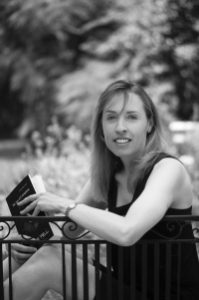
Melanie Ifield
I’m going to let you in on a little secret. Sometime I get the feeling the characters I create had a life before I got my mitts on them.
Yes, I know that sounds crazy (I prefer fanciful, thank you very much). But I can’t help the feeling that they have merely allowed me a glimpse into their lives.
Let me explain.
It all began years ago….
I’ve been writing stories in some form or another, since I could pick up a pencil. The only trouble with all this activity is, I seldom proceeded much past chapter one. There were loads of characters and jumbled plots, but no continuation through a coherent storyline. Each character appeared, fully formed, said their piece, and then exited stage left. If I had chosen to publish this material, I would have had a full length novel, with new people with their own dramas, each new chapter. An intriguing idea, but terribly confusing to read, I would imagine.
It took me years to realise what the problem was.
I wasn’t invested in the characters enough to continue their story.
They had no lives of their own before I came along, nor could they sustain one long after I’d gone. They merely emerged one day and disappeared the next.
So how did I go from one scene wonder, to a four book children’s fantasy series and nearly five hundred pages of adult romantic thriller?
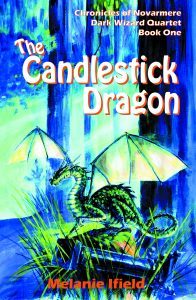
It takes investment and discipline.
Perhaps you have a novel in your mind, partially fleshed out characters and several scenes of you own that keep getting stuck. Or you are simply curious about the writing process. I would love to give you the all-expenses paid novel busting approach that guarantees you’ll complete it! But I doubt it ever really existed.
What I learned in all my research, the courses I took and the information so kindly offered to me from other authors is… everyone has their own way of slogging it out till the end. Some plan the whole thing, each chapter and every scene so they never get writers’ block because it is all laid out beforehand. A start, a middle and an end. Others wing it. And some follow where the characters lead.
I follow. They lead.
I didn’t even begin to see the changes, but they are obvious now I look back. I started to dream of the characters involved. I would talk to them out loud, or nut out a plot point with them, walking in nature. I was obsessed with them – who they were, who they reminded me of in ‘real life’, and whether this was merely a physical resemblance or something more substantial?
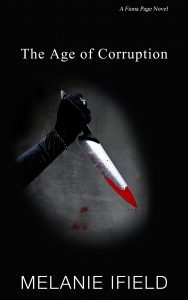
Were they heroes or villains or a mixture of both, as in the case of Jonelle from The Age of Corruption, because there is really very little black and white in life? Even the villains have shades of grey and redeeming qualities.
They took over every available inch of my mind, until I could not deny them the space required to tell their story.
Yes, they had a past, and it was complex and messy. The story I was telling was coloured by that, but not about the past really at all. They stepped into the scene and didn’t leave until that point in their lives, that part of their stories, was over. Regardless of if they were 12-year-olds riding dragons, or twenty nine year olds dodging bullets.
What did I learn from splitting myself between adult action/adventure and a fantasy series for ages twelve and over, and actually completing them?
I learned that switching between the age groups was impossible. I had to write one complete novel before I began the next. By knowing and loving the characters, I could no longer abandon them after chapter one to write another book. I had to find the discipline to end it first. Not only that but the tone of the adult novel (with sex and adultery, violence and murder) could not be allowed to splash over into the junior fiction. Constantly switching between the voices didn’t come naturally to me, so I had no choice but to write one, then the other.
I learned that not everyone sees the action, or the sweet inconsistencies, as just a part of the lives created on a page. Paradoxically, fiction needs to be smoother than real life in order to create a feeling of reality and not to jolt a reader out of the story. Random moments of being human – messy, inconsistent, out of character – don’t always translate onto the page. And yet, sometimes, I let it go, even if it annoys readers, because one piece of advice I received echoes strongly in my head – write what you love. Life and people are not always smooth or rational and I love that. So I write it. Motivations and choices are not always clear cut, simple or even expressed. So I write that too.
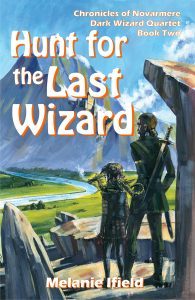
While I was writing fantasy to escape the confines of the rules of our society, I discovered that in doing so, I had created a whole new world with its own rules that I needed to adhere to, so really, there is no way to escape society’s expectations, even if you go across time and space to a whole new realm to do so. You simply find different rules to conform to.
Somewhere along the way, I came to the realisation that it was quite possible to write my characters into a spot of bother where neither I, nor they, could get them out of it and I had to erase the entire chapter so they didn’t go there in the first place.
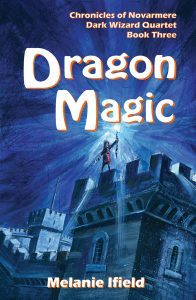
Mostly, however, I learned that to get past Chapter One, you have to be emotionally involved with the characters, and what is happening. Whether as the reader or the writer – without that attachment, the characters can exit stage left at the end of the first chapter and you simply do not follow.
I believe books speak to us as humans. Storytelling draws us together, allows us to share ideas, hopes, dreams, fantasies and ideas of what it means to be human. How? They show us things about ourselves, about our shared humanity and offers us a look at the lives and emotions of others.
By caring about the lives, motivations and fears and hopes of my characters, suddenly going from Chapter One to The End was uncomplicated.
Never easy, but simply the next step as I followed them to the end of their current adventures.
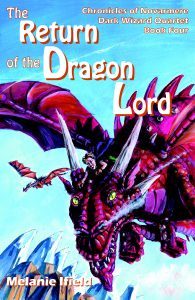
Melanie Ifield
Melanie Ifield was born and raised in country Australia where she returned when she became chronically ill seven years ago. Healing from long term illness is a marathon race, and one she is looking forward to completing one day so she can go back to horse riding, hiking, swimming and dancing, as well as the occasional motorbike ride!
‘For now and forever – my aim and passion is to write. My dream is for my books to find their audience, and for me to heal; then write some more. Write as often and as much as I can while I can. I’ll change tone, change voice, and change genre. I’ll write in novels, in journals, on my blog, in my notebook and on post-it notes… Because what are we if we are not our passions?’
Melanie writes fiction for children, young adults and adults. Check out her website at https://melanieifield.wordpress.com
Please Feel Free to Share:







December 16, 2016
Reading Suggestions from Jacey Bedford and Melanie Ifield
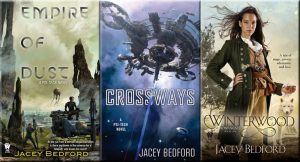
My thanks to Jacey Bedford for sharing some of her favourite reads – past and present – on the Guest Blog this week in Too Many Books Not Enough Time and for giving us some great recommendations to search out just before the holidays!
And if you’re looking for some delightful dragon stories for readers of all ages, do drop by the Guest Blog on Monday to discover Melanie Ifield’s insightful thoughts on My Learning Curve to Writing (and check out her Nilofar novels here.)

Please Feel Free to Share:







December 11, 2016
Jacey Bedford Shares Her Thoughts about the Importance of Reading
My next guest (December 12th) on the Guest Blog is Jacey Bedford.
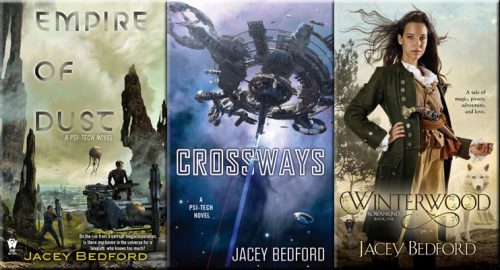
Do drop by to discover some excellent reading recommendations as she shares her thoughts on Too Many Books, Not Enough Time. (We can all relate to that!)
Please Feel Free to Share:










